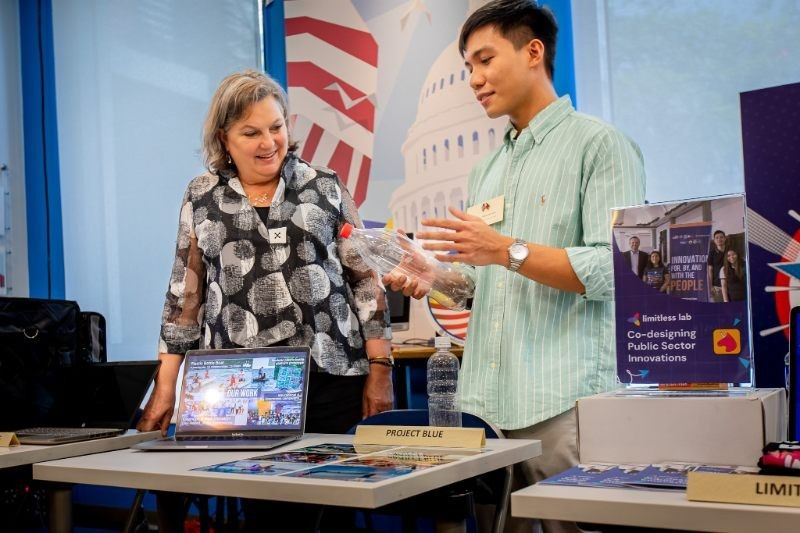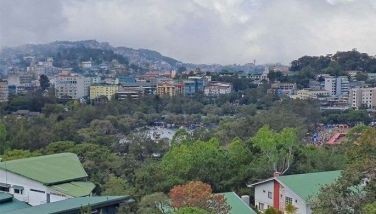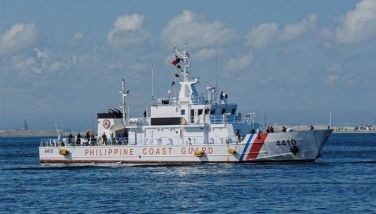Top US diplomat floats alliance with Japan, Australia to aid Philippines

MANILA, Philippines — The third highest-ranking official at the US State Department raised the possibility of engaging Japan and Australia to help the Philippines in security and economic issues amid the increasing assertiveness of China in the Asia-Pacific.
Speaking to select reporters on Monday during her visit to the Philippines, US Undersecretary for Political Affairs Victoria Nuland said there have been discussions on strengthening multilateralism in the region, particularly with Tokyo and Canberra, which she described as having “strong alliances” with Washington.
“We have shared interests, obviously, in maintaining strong democracies, in maintaining free and open commerce and ensuring that even as we compete with China, we are preventing conflict and we are working together to keep the straits free and open and all those things,” Nuland said in response to a query on joint patrols in the South China Sea.
“The idea here is obviously, we have a strong alliance together, but we’re even stronger when we combine forces with other democracies,” she added later in the briefing.
Just two weeks ago, US naval operations chief Admiral Michael Gilday said during his visit to the Philippines that Washington is “committed” to conducting joint maritime patrols with Manila in the disputed strategic waterway.
Nuland said the US is “working on the cadence and plans for those.”
Teresita Daza, the spokesperson for Manila’s Department of Foreign Affairs, said last week that the government is crafting guidelines on maritime activities, including joint patrols, in the West Philippine Sea or the part of the South China Sea that the country claims.
Daza said operational details, including the possibility of engaging other regional partners, will be part of discussions between the Philippines and the US through the Mutual Defense Board and Security Engagement Board, which coordinate a framework for defense and security cooperation between the militaries of Manila and Washington.
EDCA consultations underway
On top of building up multilateral ties, Nuland stressed the need to strengthen the US-Philippines alliance in the face of what she called “China’s increasingly aggressive and coercive behavior” in security and economics.
“We also need to strengthen the structures of alliance that allow us to maintain a free and open Indo-Pacific,” she said, using the American term to refer to the Asia-Pacific.
Among these are the four additional sites in the Philippines identified under the Enhanced Defense Cooperation Agreement under which US troops will have access to military bases in the country. This, Nuland said, “will make us stronger” not just in security but also in humanitarian contingencies and economic opportunities.
Nuland said local communities where the four new EDCA sites will be located are being consulted upon, but she deferred to the Philippine government to announce where these sites will be.
“We want to do these in places where we have the opportunity to train together, but also in places where, should there be a natural disaster contingency, they’re far away enough from that that they would still be able to survive and be useful in that context,” she said.
While there have been no announcements as to where the new EDCA sites will be located, it has been reported that the US asked for access to bases in Isabela, Zambales and Cagayan facing north towards Taiwan, and on Palawan near the disputed Spratly Islands in the West Philippine Sea.
US not seeking conflict
Reports of EDCA sites being established up north raised concerns from Senate foreign affairs panel chairperson Imee Marcos who suggested last week during an inquiry that these may be used by the US as bases or staging grounds in the event of a conflict in Taiwan, a self-governing democracy that China considers to be a renegade province.
Nuland reiterated the stance of the US that its policy of recognizing Beijing as the legitimate Chinese state has not changed, but added that they “don’t want to see a change in the status quo.”
“We want a free open Indo-Pacific. We will continue to ensure that we are supporting Taiwan as needed and that we are ensuring that the international waters remain free and open,” she said.
She continued: “It’s really up to China what kind of future they want to have. But it is not we that seek conflict in any way.”
‘We need each other’
The Philippines under the administration of President Ferdinand Marcos Jr. has significantly warmed up relations with the US compared to his predecessor Rodrigo Duterte who opted to pivot towards China.
Still, Marcos said he is maintaining a “friends to all, enemies to none” policy when it comes to foreign affairs.
Since he took office, a flurry of top US officials, including Vice President Kamala Harris, have visited the Philippines in a continuing bid to strengthen bilateral ties.
Nuland said they are trying to get as many senior US officials to visit the Philippines and as many senior Filipino officials to visit Washington.
“We really are in this growth period in our relationship both on the security side and the economic side,” she said. “We need each other at this moment of intense challenge to democracy, freedom, sovereignty and territorial integrity.” — with reports from Kaycee Valmonte
- Latest
- Trending





























